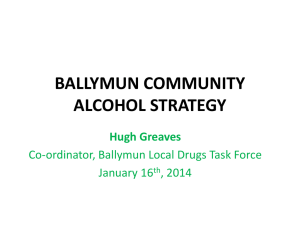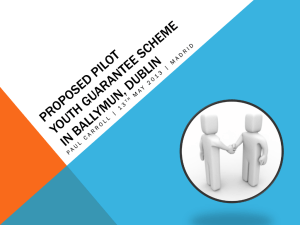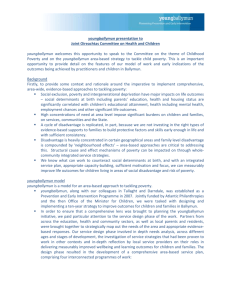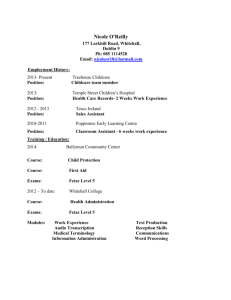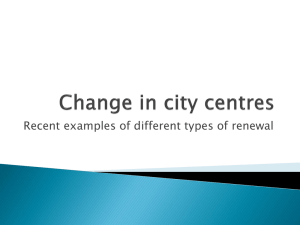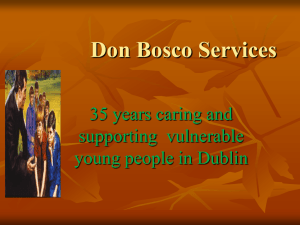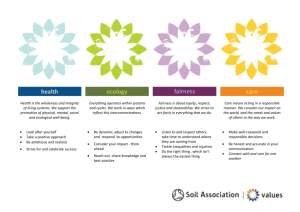The contractor/external evaluator will in the first 12
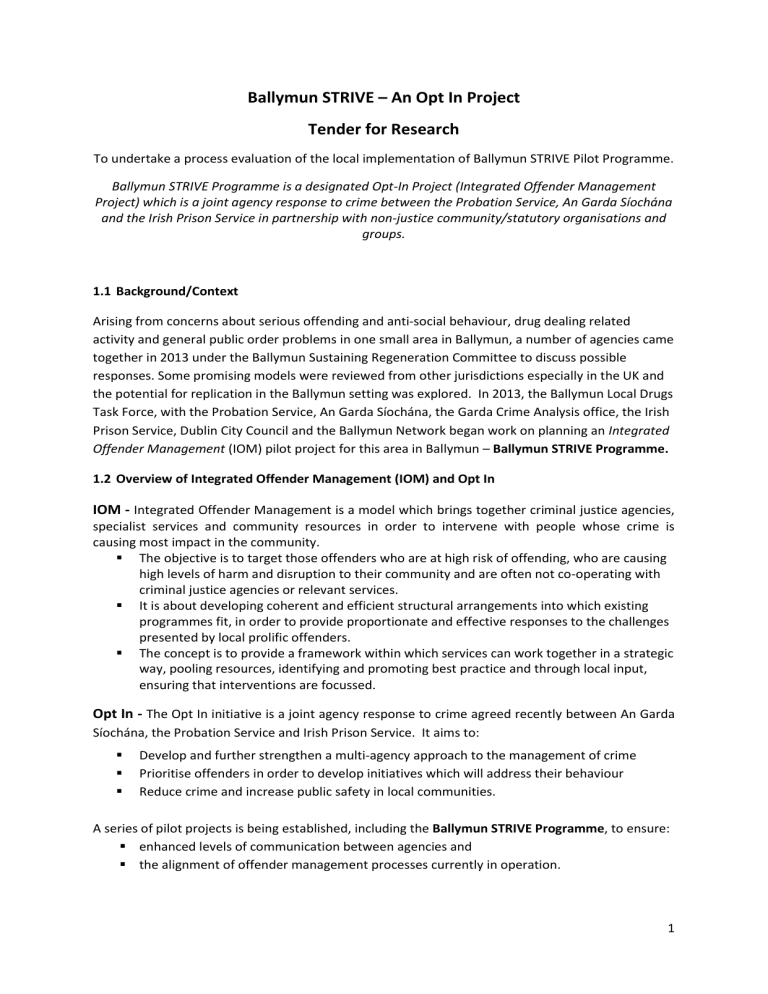
Ballymun STRIVE – An Opt In Project
Tender for Research
To undertake a process evaluation of the local implementation of Ballymun STRIVE Pilot Programme.
Ballymun STRIVE Programme is a designated Opt-In Project (Integrated Offender Management
Project) which is a joint agency response to crime between the Probation Service, An Garda Síochána and the Irish Prison Service in partnership with non-justice community/statutory organisations and groups.
1.1
Background/Context
Arising from concerns about serious offending and anti-social behaviour, drug dealing related activity and general public order problems in one small area in Ballymun, a number of agencies came together in 2013 under the Ballymun Sustaining Regeneration Committee to discuss possible responses. Some promising models were reviewed from other jurisdictions especially in the UK and the potential for replication in the Ballymun setting was explored. In 2013, the Ballymun Local Drugs
Task Force, with the Probation Service, An Garda Síochána, the Garda Crime Analysis office, the Irish
Prison Service, Dublin City Council and the Ballymun Network began work on planning an Integrated
Offender Management (IOM) pilot project for this area in Ballymun – Ballymun STRIVE Programme.
1.2
Overview of Integrated Offender Management (IOM) and Opt In
IOM -
Integrated Offender Management is a model which brings together criminal justice agencies, specialist services and community resources in order to intervene with people whose crime is causing most impact in the community.
The objective is to target those offenders who are at high risk of offending, who are causing high levels of harm and disruption to their community and are often not co-operating with criminal justice agencies or relevant services.
It is about developing coherent and efficient structural arrangements into which existing programmes fit, in order to provide proportionate and effective responses to the challenges presented by local prolific offenders.
The concept is to provide a framework within which services can work together in a strategic way, pooling resources, identifying and promoting best practice and through local input, ensuring that interventions are focussed.
Opt In -
The Opt In initiative is a joint agency response to crime agreed recently between An Garda
Síochána, the Probation Service and Irish Prison Service. It aims to:
Develop and further strengthen a multi-agency approach to the management of crime
Prioritise offenders in order to develop initiatives which will address their behaviour
Reduce crime and increase public safety in local communities.
A series of pilot projects is being established, including the Ballymun STRIVE Programme, to ensure:
enhanced levels of communication between agencies and
the alignment of offender management processes currently in operation.
1
1.3 The Ballymun STRIVE Programme is a 24 month pilot project.
A range of stakeholders are involved in the Project including;
Irish Prison Service
An Garda Síochána
Probation Service
Ballymun Social Regeneration Sub Committee
Ballymun Job Centre
Department of Social Protection
Dublin City Council
Ballymun Local Drugs and Alcohol Task Force
Ballymun Network for Assisting Children and Young People.
1.4
Ballymun STRIVE Programme -
Development of Project to Date
In April 2014, the working group invited Professor Paul Senior (Director of the Hallem Centre for
Criminal Justice, Sheffield Hallem University), Sally Lewis (Chief Executive of Avon and Somerset
Probation Trust) and Maura Muldoone (PSNl, Head of Policing with the Community Branch) to discuss how the model works in communities in the UK and Northern lreland and how it might be implemented in Ballymun. A commitment was also made at this time by An Garda Síochána, the
Probation Service and Ballymun Network to establish an operational team to target approximately fifteen over-18 ‘prolific offenders’ who have the greatest impact on the local community as a result of their offending behaviour.
In October 2014, the operational team visited Bristol (recognised as a model of best practice) to undertake preliminary work in terms of planning and learn from the experience operating in the UK.
This pilot project has commenced in Ballymun and the operational team is currently selecting and assessing the target group for inclusion in the Pilot. ‘Prolific Priority Offenders’ will be informed that they will be targeted for multi-agency attention by criminal justice agencies and will be offered opportunities to desist from offending behaviour with plans being put in place to manage offenders in prison and in the community by sentence management, bail conditions, probation reports, etc.
They (including family members) will also be offered drug/alcohol treatment/assessment, education assessments and career options and general opportunities to once again participate in positive community life and occupational courses.
1.5
Rationale for Tender
As an interagency 2 year pilot project STRIVE involves agencies agreeing common goals, understandings, structures and protocols to share data, co-refer and work closely together as colleagues towards agreed aims. The outcomes (reduced offending in the catchment area, improved outcomes for clients) depend on maintaining the interactions between agencies and with the projects and clients both clear and timely. To ensure the workings of the project are optimised and remain so an assessment and recording of the processes is necessary.
Learning from the Ballymun pilot site would also benefit other communities outside of Ballymun who are experiencing similar issues. Having optimised and clearly defined processes would be a prerequisite for this replication. An independent expert to conduct a process evaluation as the IOM pilot develops means that the optimum structure and process can be reached more rapidly than a trial and error approach.
2
A process evaluation would initially focus on the first year of the STRIVE implementation looking at how the model was developed in Ballymun in the first place, how it is being implemented, look at similar schemes in the UK and elsewhere and make recommendations for improvement. The project would then take on board this initial assessment over the following 6 months. In the final 6 months of the pilot project the process evaluator would reassess the project to see how recommendations have been taken on board. Importantly the analysis would also provide a guidance document for the implementation of this approach in other areas of Ballymun or elsewhere and with other age/target groups.
An outcome evaluation will also form part of the Ballymun STRIVE work programme and will be completed by the stakeholders led in this case by the Garda Síochána Analysis Service.
1 Other community indicators will also be measured over time.
2 The terms of reference of this tender therefore does not include an outcome evaluation, focussing only on the process evaluation.
However, it is important that process evaluation provides sufficient context and insight to the operations and implementation of the Project in order to analyse associated outcomes.
1.6
Terms of Reference
The steering group of the Ballymun Integrated Offender Management - STRIVE Programme request tenders proposals in relation to meeting the terms of reference as set out below.
The process assessment will be performed over 2 time periods;
1) the first 12 months of the STRIVE pilot project to the end of 2015
2) the final 6 months of the STRIVE pilot project to the end of 2016
Research Aim
To undertake a process evaluation of the local implementation of Ballymun STRIVE pilot Programme.
The contractor/external evaluator will in the first 12 months of the contract; a.
Design a process evaluative framework for the project incorporating appropriate data collection methods and timelines. b.
Develop structures to monitor the progress of the project and understand the processes that are taking place. c.
Analyse results and provide a critical analysis of the findings which will draw clear recommendations and conclusions for informing the work of the STRIVE project during the final 6 months of the pilot.
In the final 6 months of the STRIVE pilot, the project will be reassessed to determine if optimsed processes are being implemented.
1 The offending behaviour of the target group pre and during involvement in the scheme, the crime situation of the area itself pre and during IOM (with a comparison with a similar ‘control’ are where IOM is not present)
2 Measure of local community quality of life and experience of crime in the area will also be undertaken,
Innovate Ballymun, DCU in the Community completed a survey in the area in May 2014 – follow up surveys of the area are proposed on a yearly basis
3
A final report will be compiled to include:
a description of the process required for development of the STRIVE model,
key learning from this process,
key outcomes of inter-agency working and emerging recommendations for further development and delivery of the Project.
This final report would serve a guiding document for the implementation of this approach in other locations. Final report will also include;
a literature review and reference to similar studies in the area of Integrated Offender
Management Programmes
methodology by detailing the manner in which the research was undertaken
All reports will be reviewed by a Research Advisory Group before being finalised. All data/research will remain the property of the IOM Steering Group.
Data Collection
It is envisaged that the contactor will employ a mixed methods approach (e.g.; questionnaire, indepth individual interviews, case studies, focus groups etc) in order to obtain information in relation to the aims and objectives of the research.
Data will be collected from members of steering group/operational team group, stakeholders/partner agencies (as per section 1.3) in addition to organisations involved in the case management of offenders (addiction, accommodation, family support, education, training & employment and health services etc), targeted offenders and their families. 3
Key Questions -Some of the areas explored as part of the process evaluation will include;
What specific interventions were put in place to respond to the needs/issues presenting
Examination of systems/practices/protocols/shared values underpinning work
Nature and extent of participation and involvement, agency participation
How the partnership model of delivery is working – what is the added value that comes from being part of this partnership – sum of the collaboration
The extent to which agencies/local organisations feel supported in responding to presenting issues among clients, linkages and associations made
How the target offender group find the programme is working for them
What factors are contributing to successful programme implementation
What factors are inhibiting the achievement of objectives/ any challenges
How the project contributes to further learning around local delivery of responses
How the project influences local and national policy
What resources did the project have and how were they used
Effectiveness of targeting resources / profile of client referrals etc
Nature and extent of capacity building
3 It is envisaged that the contractor will review other relevant studies and data collection used in this area (eg
Senior et al, 2011 at Sheffield Hallam University, Process Evaluation of Five Integrated Offender Management
Pioneer Areas ) in order to select methods that would be most feasible to the Ballymun context and operational design.
4
Implications for continued practice
1.7 Role/Deliverables of the Contracted Consultant/Company
Delivery of this work within the agreed contract period;
Quarterly written updates on progress and attendance at research advisory group
meetings when requested;
A draft report document to be submitted to the research advisory group for feedback which includes clear findings based on the analysis of information gathered and collated.
A final document and PowerPoint presentation of the findings which is signed off and agreed by the research advisory group.
1.8 Value of Tender
The value of the tender is expected to be no more than
10,000
euro to cover the term of the contract. This research is being funded by Dublin City Council. The price stated must be the maximum total all-inclusive price for the duration of the tender. Price increases during the term of contract will not be accepted.
1.9 Tender Assessment Procedure
A tender assessment panel will examine all tenders received. The panel will have to be satisfied that the method and programme of work meet the project’s objectives and are cost effective. The panel will also take into account other criteria to include;
1.
Clear demonstration and understanding of the issues and task being addressed;
2.
Level, depth, nature of experience in the area (quality of and relevance of previous work).
3.
Evidence that they possess the relevant skills in order to carry out the study;
4.
Ability to effectively manage and complete the contract within given timeframe;
5.
Overall assessment and quality of proposal.
1.10 Tender Proposal:
The proposal should address or include the following details:
Knowledge and experience of community/statutory systems and environments, inter-agency working.
Personnel Specification – details of personnel to be involved in design & delivery of this brief to include relevant evidence/experience relevant to the tender brief.
Roles of team members to be assigned for the implementation of the research programme.
Proposed timetable and description of facilitated activities and sessions
Detailed breakdown of costs which must be all-inclusive over this time frame.
Tax Clearance Certificate
1.11 Timescale
The closing date for receipt of applications for the above tender is Wednesday February 18 th
2015. Tenders may be submitted via email or post. Tenders that are delivered late or incomplete will not be considered.
Applications will be short listed and invited to present their tender to a panel during the week beginning March 2 nd 2015.
The successful applicant must be in a position to begin work as soon as possible and fulfil the contact requirements over the time period set out in the terms of reference. Before a
5
contract is awarded, the successful contractor will be required to produce a valid tax clearance certificate.
1.12 Contact & Queries
Tender submissions and/or any queries concerning this request for tender should be addressed to:
Marie Lawless
Policy and Research Officer
Ballymun Local Drugs Task Force
Axis Centre
Main Street
Ballymun,
Dublin 9
Tel: 01 8832142 E-mail: marie@ballymundtf.ie
6
